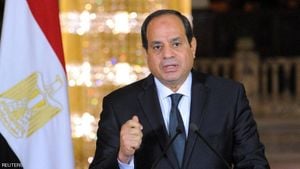Algeria is experiencing significant political changes aimed at addressing pressing social and economic issues. The government has recently launched several initiatives meant to improve the living conditions of its citizens as well as the overall political atmosphere.
According to Ahmed Ouyahia, the Algerian Prime Minister, "The government's recent initiatives aim to strengthen our commitment to the people". This statement signals the government's intent to become more responsive to the needs of its citizens amid increasing public demand for change.
Among the proposed reforms is the enhancement of social welfare programs to alleviate poverty and provide support for vulnerable populations. Communities have expressed frustration over rising unemployment and inflation, prompting leaders to take urgent action. The government has pledged to create jobs and invest more heavily in public services.
The focus on socio-economic reforms has garnered attention from various political leaders. Saïd Chengriha, the Minister of National Defense, stated, "We must address the concerns of all citizens to create a united front for progress". His remarks reflect a growing recognition within the government of the need to engage with public sentiment and unify efforts across diverse sectors of society.
This wave of political activity follows widespread protests over the past few years, where citizens voiced discontent with the status quo and called for reforms. The government's response aims to avoid the stagnation and unrest of the recent past by committing to more transparent and accountable governance.
Public forums and town hall meetings have become common venues for citizens to express their opinions on proposed initiatives. Many residents feel empowered by the attention being paid to their communities, viewing it as a shift toward greater inclusiveness within the political process.
Critics, nevertheless, warn of the potential pitfalls of these changes. Some question whether the proposed actions will truly alter the underlying drivers of economic malaise and political discontent. Others fear the reforms may not go far enough to dismantle entrenched interests within the government.
Nevertheless, fervent discussions and debate characterize the political atmosphere. With elections looming, many political analysts predict these developments will influence voter sentiment. Campaigns are expected to be heavily focused on socioeconomic issues, with political parties needing to argue their plans effectively to secure public support.
For many Algerians, the significance of these political events extends beyond mere policy outcomes; they represent hopes for systemic change. Observers note; if the government follows through on its commitments, it could pave the way for long-term stability and growth.
With the political elite increasingly aware of the potential consequences of public dissatisfaction, Algeria stands at a crossroads. While the path forward is uncertain, the current focus on reform, dialogue, and outreach offers citizens reason for cautious optimism.



